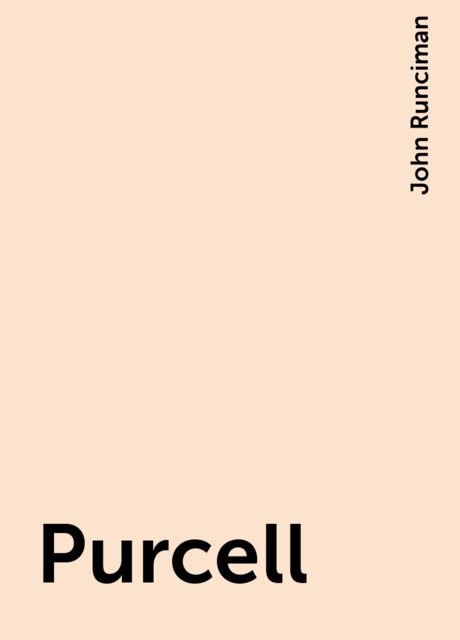Purcell
- Xuraman Memmedovahar citeratför 5 år sedanWe once had a glorious school of composers. It departed, with no sunset splendour on it, nor even the comfortable ripe tints of autumn. The sun of the young morning shone on its close; the dews of dawn gleam for ever on the last music; the freshness and purity of the air of early morning linger about it.
- Xuraman Memmedovahar citeratför 5 år sedanOn one point we may be quite certain. It is the greatest pity that Purcell wasted so much time on these Restoration shows. When the English people revolted against Puritanism, and gave the incorrigible Stuarts another chance, Charles the Wanderer returned to find them in a May-Day humour. They thrust away from them for a little while the ghastly spiritual hypochondria of which Puritanism was a manifestation, and determined to make merry. But, heigh-ho! the day of Maypoles was over and gone. From the beginning the jollity and laughter were forced, and the new era of perpetual spring festival soon became an era of brainless indecency. Even the wit of the Restoration was bitter, acid, sardonic (as Charles's own death-bed apology for being an unconscionable time a-dying). Generally it was ill-tempered, and employed to inflict pain. And there was not even wit in most of the plays. It is hard to see what even the worst age could discover to laugh at in Shadwell's Libertine, the story of Don Juan told in English, and, in a sense, made the most of.
- Xuraman Memmedovahar citeratför 5 år sedanIf the Circe music is indeed Purcell's, it cannot have been written until the author, Davenant, had been in his grave seventeen years. If only the estimable ladies and gentlemen whose passion for writing about Purcell has wrapped the real man in a haze of fairy tales had taken the preliminary trouble of learning a little of the literature and drama of Purcell's day! Nay, had they only looked at the scores of Purcell's "operas"! Most of these plays undoubtedly had some music from the beginning. It will be remembered that during the Puritan, joyless reign of dunderheadedness the playhouses were closed; but Cromwell, who loved music and gave State concerts, licensed Davenant to give "entertainments"—plays in which plot, acting, and everything else were neglected in favour of songs, dances, and such spectacles as the genius and machinery of the stage managers enabled them to devise. When the Puritan rule faded, the taste for these shows still persisted.
- Xuraman Memmedovahar citeratför 5 år sedanTallis, Byrde, Whyte, Orlando Gibbons
- Xuraman Memmedovahar citeratför 5 år sedanThis is not a fanciful description: it is the plainest, most matter-of-fact description. Purcell's music has the same effect on the mind as a crowd of young leaves shooting from a branch in spring; it has a quality of what I risk calling green picturesqueness, sweet and pure, and fresh and vigorous. It is music that has grown and was not made. That Purcell knew perfectly well what he was doing we realise easily when we turn to the music he set to particular words. Take The Tempest music, and turn to the song "Arise, ye subterranean winds." See how the accompaniment surges up in imperious, impetuous strength. Turn to "See, the heavens smile": note how the resonant swinging chords and that lovely figure playing on the top give one an instant vision of vast, translucent sea-depths and the ripples lapping above. Look at "Come unto these yellow sands" and "Full fathom five": he almost gives us the colour of the sea and the shore. These things did not come by accident, nor do they exist only in an enthusiastic fancy. They were meant; they are there; and only the deaf and the stupid, or those over-steeped in the later classical music, can help feeling them
- Xuraman Memmedovahar citeratför 5 år sedanThat essence was in him; he made it his own and gave it to us. He did not use much of the folk-songs born of our fields and waters, woods and mountains, and the hearts of our forefathers who lived free and did not dream of smoky cities and stinking slums; though folk-song shaped and modified his melodies. In himself he had the spirit of Nature, and it made his music come forth as it makes the flowers blow. The very spirit of the earth seemed to find its voice through him, the spirit of storm and the spirit of fair weather that sports when sweet rains make a musical clatter among the leaves. The music in which he found a voice for Nature cannot grow old while the earth renews its youth with each returning spring. In its pathos and in its joy the soul of seventeenth-century England is in his music in perennial health.
fb2epub
Dra och släpp dina filer
(upp till fem åt gången)


